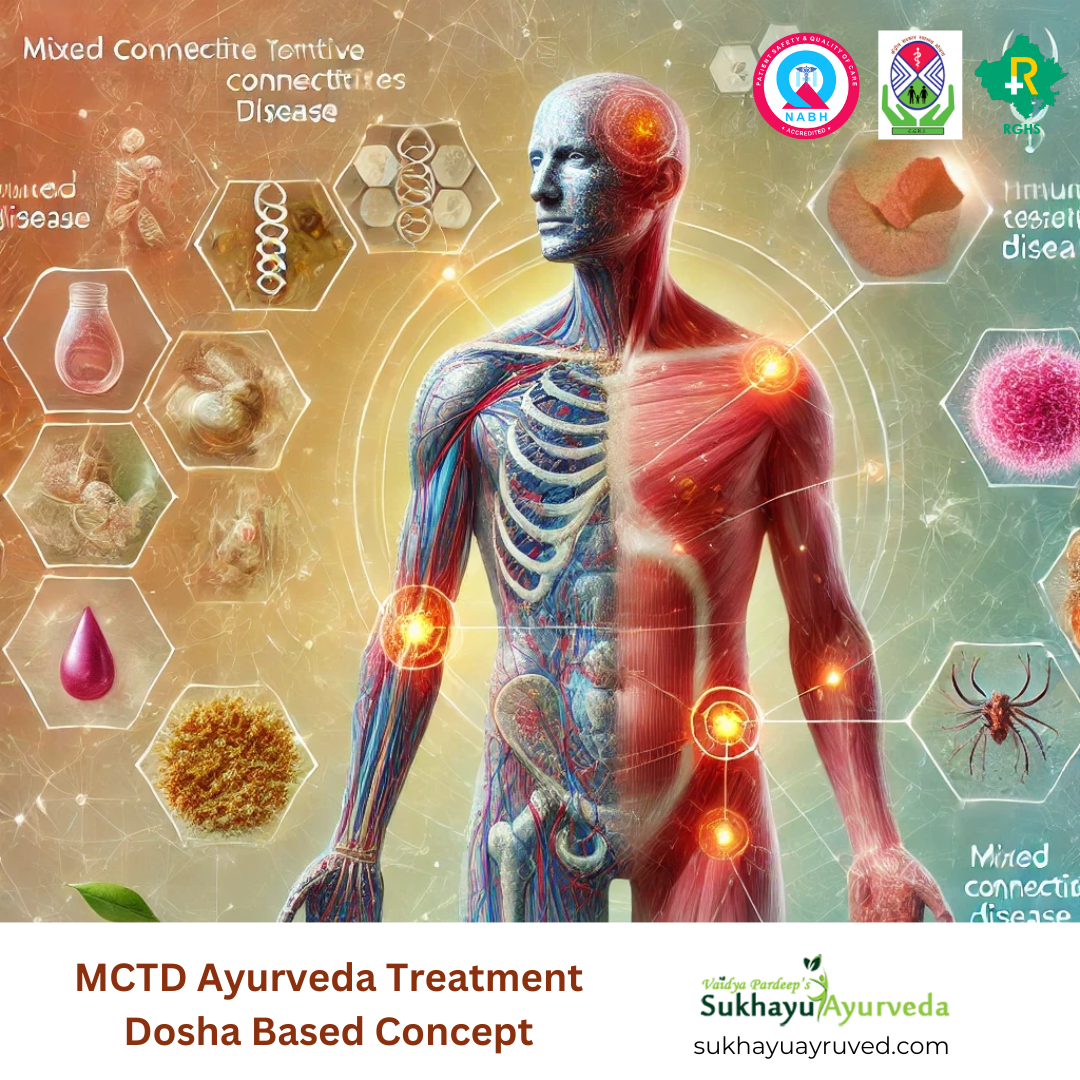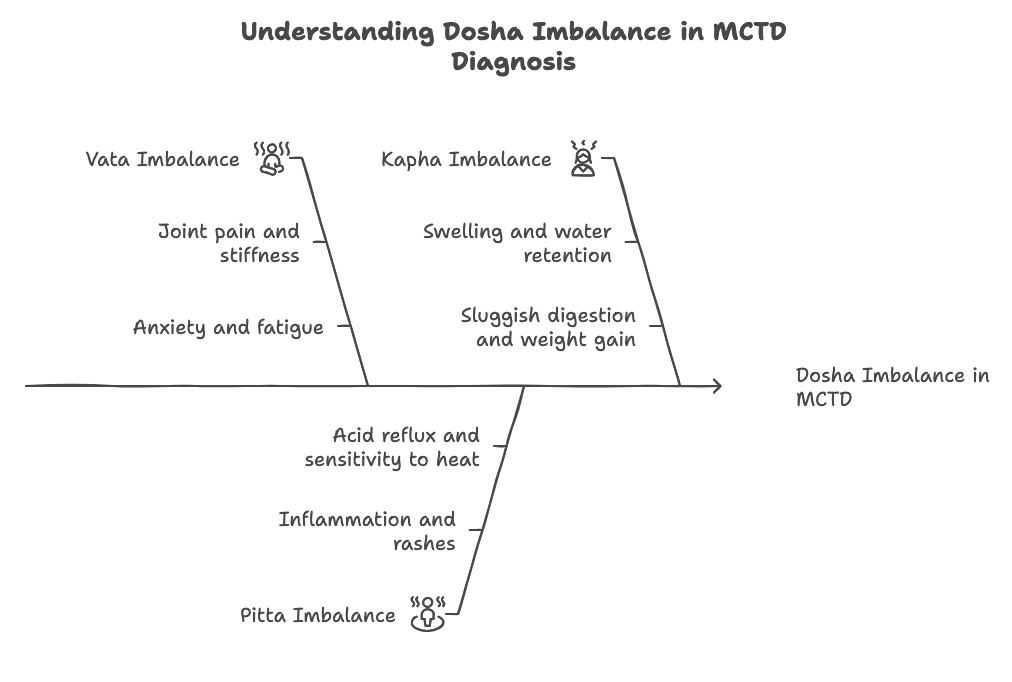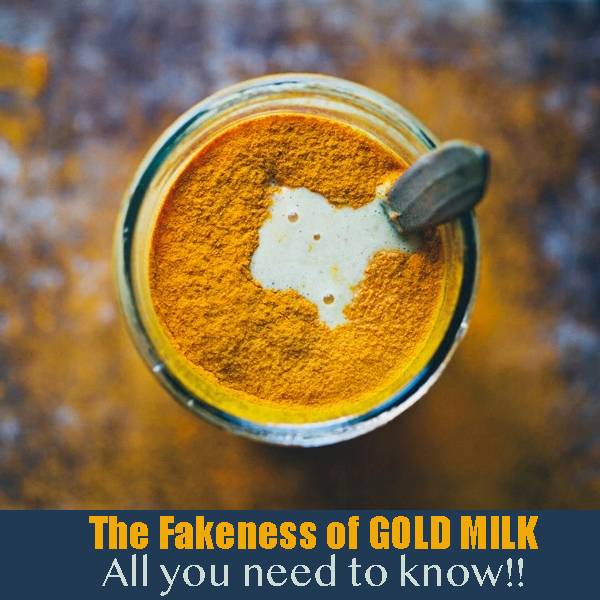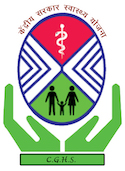Managing MCTD with Ayurveda – Dosha Based Approach

You go to any page of the website, you will find- Vata, Pitta and Kapha for sure. Because Ayurveda works on the concept of the doshas. But when it is said that some diseases are Vata, others are Pitta and rest are Kapha. We all start thinking that- there is no involvement of other doshas as causative factors. This is not true. Every diseases has all the three doshas and specifically in case of autoimmune diseases. Same is applicable to Mixed Connective Tissue Disease (MCTD). Even all the doshas involve in the process of disease but certainly one or two doshas are dominant. And once an Ayurveda physician is able to mark the doshas in proper order- it becomes easy to treat the condition. At Sukhayu Ayurved we follow the same approach of dosha based treatment in MCTD therefore ensures the best results with ayurvedic treatment of MCTD.
Here we will look at the role of Doshas in the pathological process of MCTD.
Role of Tridoshas in Mixed Connective Tissue Disease (MCTD)
The disease manifests through varying symptoms based on the predominant Dosha imbalance. This manifestation always represents itself by signs and symptoms. By looking at the symptoms it becomes easy to know and understand the imbalance among Vata- Pitta and Kapha.
These are the basic tools for the MCTD diagnosis. Once we have understanding of the condition it helps in Anshansh Kalpana (The Guna based understanding) of the condition and with that approach- the right treatment can be executed.
Signs and Symptoms According to Dosha Imbalance
| Dosha | Signs & Symptoms |
|---|---|
| Vata | Joint pain, muscle stiffness, dry skin, cold extremities, anxiety, fatigue |
| Pitta | Inflammation, rashes, acid reflux, burning sensation in joints, sensitivity to heat |
| Kapha | Swelling, water retention, sluggish digestion, weight gain, brain fog |
Identifying the dominant Dosha imbalance is crucial for determining the Ayurvedic treatment approach for MCTD.

Dosha Imbalance Questionnaire for MCTD Patients
To help determine the predominant Dosha imbalance in MCTD, answer the following questions:
- Do you experience dryness, stiffness, and cracking joints? (Yes/No)
- Are your symptoms worse in cold weather? (Yes/No)
- Do you often have burning sensations, inflammation, or redness in the joints? (Yes/No)
- Do you suffer from acid reflux, heartburn, or excessive thirst? (Yes/No)
- Do you feel heavy, sluggish, and retain water? (Yes/No)
- Do you experience brain fog, weight gain, and slow digestion? (Yes/No)
- Are your symptoms triggered by stress, anxiety, or excessive activity? (Yes/No)
- Do you feel overly heated or irritable? (Yes/No)
- If you answered Yes to mostly 1, 2, and 7, your imbalance is likely Vata.
- If you answered Yes to mostly 3, 4, and 8, your imbalance is likely Pitta.
- If you answered Yes to mostly 5, 6, your imbalance is likely Kapha.
According to this general assessment you can message us from the whatsapp button below this will help us to help you properly.
Ayurvedic Approach to MCTD Management
As we know Ayurvedic treatment for MCTD focuses on balancing the Tridoshas. So according to the doshas we choose- Vaman, Virechana and Basti- whatever can help better to a patient. Therefore results become quicker with this assessment. Even selection of medicine becomes easier and these are pin-pointed.
- Vata-dominant MCTD: Vata is dry, causes constriction, impacts nerves and brittles the cartilages. So in case of Vata dominant MCTD- the main treatment becomes Basti, Pizhichil and Avagahana etc. along with some external treatments.
- Pitta-dominant MCTD: The focus is on reducing inflammation, improving digestion, and calming excess heat in the body to prevent further tissue damage. Virechana and milk and ghee based treatments help in this condition.
- Kapha-dominant MCTD: Deep detoxification and metabolic stimulation through Vaman like strong procedure help to reduce fluid retention, eliminate sluggishness, and improve overall energy levels.
Is MCTD Curable?
MCTD is a chronic autoimmune disorder which affects the connective tissues all over the body. And while modern medicine classifies it as incurable, Ayurveda aims to control symptoms, reduce dependency on medications, and restore balance. Our patients of MCTD are leading a normal life. Because we worked on the pathological process through our Dosha based approach of treatment. Not just the management of the symptoms without proper diagnosis.
Sukhayu Ayurved’s Ayurvedic treatment plan, patients can significantly improve their condition, reduce flare-ups, and enhance mobility. While a complete cure may not be guaranteed, Ayurveda provides a holistic and sustainable approach to managing MCTD effectively and that too without dependency on medicines for life long.
Conclusion
Managing MCTD with Ayurveda offers a natural, long-term solution for reducing symptoms, enhancing quality of life, and preventing disease complications. By addressing the root cause through personalized treatment, dietary adjustments, and lifestyle modifications, Ayurveda empowers individuals to live a healthier and more balanced life.
For expert guidance and customized treatment, consult the experienced Vaidyas at Sukhayu Ayurved.
#MCTD #AyurvedicHealing #SukhayuAyurved #AutoimmuneCare #HolisticHealth














